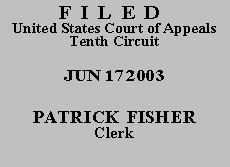

| LAWRENCE L. KELLY,
Plaintiff-Appellant, v. JOHN ROCKEFELLER, Dr.; PETER LEPSE, Dr.; WILLIAM LEEDS, Dr.; STORMONT-VAIL MEDICAL CENTER; KANSAS REHABILITATION HOSPITAL; SELECT SPECIALTY HOSPITAL, RON LINQUIST, Dr.; JAMES WARREN, Dr., Defendants-Appellees. |
|
Plaintiff Lawrence L. Kelly appeals the dismissal of his claims against the hospitals and medical personnel who cared for plaintiff's now-deceased mother. Because plaintiff had no authority to enforce criminal statutes and lacked standing to bring his mother's civil rights claims, we affirm.
Beginning in May 1999, plaintiff's mother was hospitalized in three different facilities as she suffered two strokes, amputations of both feet, high potassium levels from advanced diabetes, and congestive heart failure. Plaintiff's mother died on July 15, 1999.
On June 25, 2001, plaintiff brought this federal action against the three hospitals and the five doctors who treated his mother. Plaintiff based his claims on two criminal statutes, 18 U.S.C. § 241 and § 245, and two civil rights statutes, 42 U.S.C. § 1981 and § 1982. His pro se complaint alleged that defendants conspired against his mother because of her race, and that they gave her inadequate medical treatment amounting to murder. Plaintiff alleged that the doctors committed fraud and tortured his mother based on her race. The complaint also contained state law medical malpractice claims.
On October 31, 2001, the district court granted a motion to dismiss filed by the hospitals and three of the doctors. The district court dismissed the claims under 18 U.S.C. § 241 and § 245 for failure to state a claim, because plaintiff, as a private citizen, was not authorized to enforce criminal statutes. The court dismissed the civil rights claims because plaintiff lacked standing to bring his mother's claims, and even if he had standing, he had not shown state action or that his mother was denied a legal or property right based on her race. On that same date, plaintiff filed a "Complaint in Intervention," seeking to add his mother and brother as parties, to add claims under 42 U.S.C. § 1985 and § 1986, and to repeat his negligence claims.
On March 18, 2002, the district court granted the fourth doctor's motion to dismiss for the reasons identified in the previous order; dismissed the claims against the fifth doctor for lack of service; and struck the "Complaint in Intervention" because neither plaintiff nor his brother had standing to raise their mother's claims, which could be brought only by the legal representative of her estate. The court declined to exercise supplemental jurisdiction over plaintiff's state law claims.
We review the sufficiency of a complaint de novo, upholding the district court's dismissal for failure to state a claim only "where it is obvious that the plaintiff cannot prevail on the facts he has alleged and it would be futile to give him an opportunity to amend." Perkins v. Kan. Dep't of Corrections, 165 F.3d 803, 806 (10th Cir. 1999). We also review questions of standing de novo. Utah v. Babbitt, 137 F.3d 1193, 1203 (10th Cir. 1998).
The district court correctly dismissed plaintiff's claims under 18 U.S.C. § 241 and § 245, for failure to state a claim, because the criminal statutes do not provide for private civil causes of action. See Newcomb v. Ingle, 827 F.2d 675, 677 n.1 (10th Cir. 1987) (noting § 241 does not authorize a private right of action); Cok v. Cosentino, 876 F.2d 1, 2 (1st Cir. 1989) (same); see generally Diamond v. Charles, 476 U.S. 54, 64-65 (1986) (holding that private citizens cannot compel enforcement of criminal law). Further, § 245 explicitly reserves the right of prosecution to government officials. See 18 U.S.C. § 245(a)(1). Because plaintiff could not have amended these claims to assert a cause of action, the district court properly dismissed them.
The district court was also correct in holding that plaintiff lacked standing to bring his mother's civil rights claims. A civil rights action "must be based on the violation of plaintiff's personal rights, and not the rights of someone else." Archuleta v. McShan, 897 F.2d 495, 497 (10th Cir. 1990). In Archuleta, we held that a child lacked standing to bring a civil rights claim based on the alleged violation of his father's constitutional rights; and that the child, who was not the object of the alleged constitutional violations, could not assert a deliberate deprivation of his own rights. Id. at 496-98. The same considerations apply to plaintiff's civil rights claims.
We also agree with the district court's dismissal of plaintiff's "Complaint in Intervention." For the reasons outlined above, neither plaintiff nor his brother could bring a civil rights action based on the alleged violation of their mother's rights. Further, because plaintiff's mother was deceased, an action could not be brought in her name. Although plaintiff could have brought a federal civil rights action on behalf of his mother's estate as her appointed personal representative, see Carter v. City of Emporia, 543 F. Supp. 354, 356-57 (D. Kan. 1982), his suit was not brought in such a capacity. Thus the district court did not err in dismissing the "Complaint in Intervention."
Plaintiff argues that he had a right to sue for the wrongful loss of a family member. Although this is true, such claims arise under state law, and should be brought in a state court. The federal civil rights laws do not impose liability "for violations of duties of care arising out of tort law." Archuleta, 897 F.2d at 496.
The judgment of the United States District Court for the District of Kansas is AFFIRMED.
Entered for the Court
Circuit Judge
*. This order and judgment is not binding precedent, except under the doctrines of law of the case, res judicata, and collateral estoppel. The court generally disfavors the citation of orders and judgments; nevertheless, an order and judgment may be cited under the terms and conditions of 10th Cir. R. 36.3.